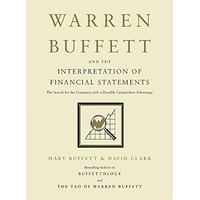Warren Buffett and the Interpretation of Financial Statements by Mary Buffett EPUB & PDF – eBook Details Online
- Status: Available for Free Download
- Author: Mary Buffett
- Language: English
- Genre: Financial Accounting
- Format: PDF / EPUB
- Size: 2 MB
- Price: Free
TWO GREAT REVELATIONS THAT MADE WARREN THE
RICHEST PERSON IN THE WORLD
In the mid-sixties Warren began to reexamine Benjamin Graham’s
investment strategies. In doing so he had two stunning revelations about
what kinds of companies would make the best investments and the most
money over the long run. As a direct result of these revelations he altered
the Graham-based value investment strategy he had used up until that time
and in the process created the greatest wealth-investment strategy the world
has ever seen.
It is the purpose of this book to explore Warren’s two revelations—
1. How do you identify an exceptional company with a durable competitive advantage?
2. How do you value a company with a durable competitive advantage?
—to explain how his unique strategy works, and how he uses financial
statements to put his strategy into practice. A practice that has made him the
richest man in the world.
THE KIND OF BUSINESS THAT WILL MAKE WARREN
SUPERRICH
To understand Warren’s first great revelation we need to understand the
nature of Wall Street and its major players. Though Wall Street provides
many services to businesses, for the last 200 years it has also served as a
large casino where gamblers, in the guise of speculators, place massive bets
on the direction of stock prices.
In the early days some of these gamblers achieved great wealth and
prominence. They became the colorful characters people loved reading
about in the financial press. Big “Diamond” Jim Brady and Bernard Baruch
are just a few who were drawn into the public eye as master investors of
their era.
In modern times institutional investors—mutual funds, hedge funds, and
investment trusts—have replaced the big-time speculators of old.
Institutional investors “sell” themselves to the masses as highly skilled
stock pickers, parading their yearly results as advertising bait for a
shortsighted public eager to get rich quickly.
As a rule, stock speculators tend to be a skittish lot, buying on good
news, then jumping out on bad news. If the stock doesn’t make its move
within a couple of months, they sell it and go looking for something else.
The best of this new generation of gamblers have developed complex
computer programs that measure the velocity of how fast a stock price is
either rising or falling. If a company’s shares are rising fast enough, the
computer buys in; if the stock price is falling fast enough, the computer
sells out. Which creates a lot of jumping in and out of thousands of different
stocks.
It is not uncommon for these computer investors to jump into a stock one
day, then jump out the next. Hedge fund managers use this system and can
make lots and lots of money for their clients. But there is a catch: They can
also lose lots and lots of money for their clients. And when they lose
money, those clients (if they have any money left) get up and leave, to go
find a new stock picker to pick stocks for them.
For More Read Download This Book
EPUB



